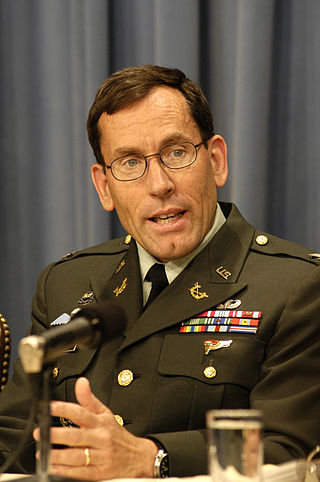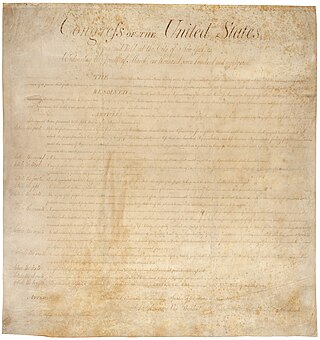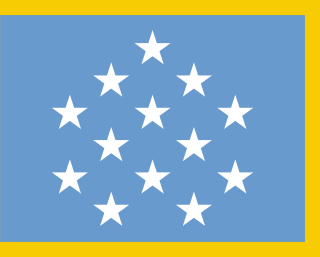
The First Amendment to the United States Constitution prevents the government from making laws that: regulate an establishment of religion; prohibit the free exercise of religion; abridge the freedom of speech, the freedom of the press, the freedom of assembly, or the right to petition the government for redress of grievances. It was adopted on December 15, 1791, as one of the ten amendments that constitute the Bill of Rights.

The Defense of Marriage Act (DOMA) was a United States federal law passed by the 104th United States Congress and signed into law by President Bill Clinton on September 21, 1996. It banned federal recognition of same-sex marriage by limiting the definition of marriage to the union of one man and one woman, and it further allowed states to refuse to recognize same-sex marriages granted under the laws of other states.
The Federal Marriage Amendment (FMA), also referred to by proponents as the Marriage Protection Amendment, was a proposed amendment to the United States Constitution that would legally define marriage as a union of one man and one woman. The FMA would also prevent judicial extension of marriage rights to same-sex (gay) or other unmarried homosexual couples.

The Prisoner of War Medal is a military award of the United States Armed Forces which was authorized by Congress and signed into law by President Ronald Reagan on 8 November 1985. The United States Code citation for the POW Medal statute is 10 U.S.C. § 1128.
The Flag Desecration Amendment is a proposed addition to the Constitution of the United States that would allow the U.S. Congress to prohibit by statute and provide punishment for the physical "desecration" of the flag of the United States. The concept of flag desecration continues to provoke a heated debate over protecting a national symbol, preserving free speech, and upholding the liberty said to be represented by that national symbol. While the proposal has been passed by the two-thirds majority required in the House of Representatives several times, it has not passed the Senate by the same super-majority and has often not come to a vote in the Senate despite its introduction several times.

NSA warrantless surveillance — also commonly referred to as "warrantless-wiretapping" or "-wiretaps" — was the surveillance of persons within the United States, including U.S. citizens, during the collection of notionally foreign intelligence by the National Security Agency (NSA) as part of the Terrorist Surveillance Program. In late 2001, the NSA was authorized to monitor, without obtaining a FISA warrant, phone calls, Internet activities, text messages and other forms of communication involving any party believed by the NSA to be outside the U.S., even if the other end of the communication lays within the U.S.

Colonel Frederic L. Borch is a career United States Army attorney with a master's degree in national security studies, who served as chief prosecutor of the Guantanamo military commissions. He resigned his commission in August 2005 after three prosecutors complained that he had rigged the system against providing due process to defendants. He was replaced by Robert L. Swann

Timothy Michael Tymkovich is a United States circuit judge of the United States Court of Appeals for the Tenth Circuit.

Milan Dale Smith Jr. is an American attorney and jurist serving as a United States circuit judge of the United States Court of Appeals for the Ninth Circuit. Smith's brother, Gordon H. Smith, was a Republican U.S. Senator from 1997 to 2009. Milan Smith is neither a Republican nor a Democrat.
The Detainee Treatment Act of 2005 (DTA) is an Act of the United States Congress that was signed into law by President George W. Bush on December 30, 2005. Offered as an amendment to a supplemental defense spending bill, it contains provisions relating to treatment of persons in custody of the Department of Defense, and administration of detainees held in Guantanamo Bay, Cuba, including:

Cook v. Gates, 528 F.3d 42, is a decision on July 9, 2008, of the United States Court of Appeals for the First Circuit that upheld the "Don't ask, Don't tell" (DADT) policy against due process and equal protection Fifth Amendment challenges and a free speech challenge under the First Amendment, and which found that no earlier Supreme Court decision held that sexual orientation is a suspect or quasi-suspect classification.
United States v. Alvarez, 567 U.S. 709 (2012), is a landmark decision in which the Supreme Court of the United States ruled that the Stolen Valor Act of 2005 was unconstitutional. The Stolen Valor Act of 2005 was a federal law that criminalized false statements about having a military medal. It had been passed by Congress as an effort to stem instances where people falsely claimed to have earned the medal in an attempt to protect the valor of legitimate recipients. A 6–3 majority of the Supreme Court agreed that the law was unconstitutional and violated the free speech protections under the First Amendment. Despite reaffirming the opinion that was previously issued by the Ninth Circuit, it could not agree on a single rationale. Four justices concluded that a statement's falsity is not enough, by itself, to exclude speech from First Amendment protection. Another two justices concluded that while false statements were entitled to some protection, the Stolen Valor Act of 2005 was invalid because it could have achieved its objectives in less restrictive ways.

In the United States, some categories of speech are not protected by the First Amendment. According to the Supreme Court of the United States, the U.S. Constitution protects free speech while allowing limitations on certain categories of speech.
In United States constitutional law, false statements of fact are assertions, which are ostensibly facts, that are false. Such statements are not always protected by the First Amendment. Often, this is due to laws against defamation, that is making statements that harm the reputation of another. In those cases, freedom of speech comes into conflict with the right to privacy. Because it is almost impossible for someone to be absolutely sure that what they say is true, a party who makes a false claim isn't always liable. Whether such speech is protected depends on the situation. The standards of such protection have evolved over time from a body of Supreme Court rulings.
valor.defense.gov, also called U.S. Military Awards for Valor, is a website published by the United States Department of Defense established in 2012 to track recipients of awards and decorations of the United States military. It currently contains the complete list of Medal of Honor recipients for actions since the September 11, 2001 attacks.

The Stolen Valor Act of 2013 is a United States federal law that was passed by the 113th United States Congress. The law amends the federal criminal code to make it a crime for a person to fraudulently claim having received a valor award specified in the Act, with the intention of obtaining money, property, or other tangible benefit by convincing another that he or she received the award.

The Medal of Honor (MOH) is the United States Armed Forces' highest military decoration and is awarded to recognize American soldiers, sailors, marines, airmen, guardians and coast guardsmen who have distinguished themselves by acts of valor. The medal is normally awarded by the President of the United States and is presented "in the name of the United States Congress."
Susan B. Anthony List v. Driehaus, 573 U.S. 149 (2014), is a United States Supreme Court case.

A military impostor is a person who makes false claims about their military service in civilian life. This includes claims by people that have never been in the military as well as lies or embellishments by genuine veterans. Some individuals who do this also wear privately obtained uniforms or medals which were never officially issued to them.











